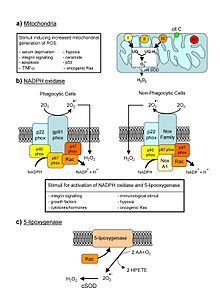റിയാക്ടീവ് ഓക്സിജൻ സ്പീഷീസ്
രാസപ്രവർത്തനസ്വഭാവമുള്ള ഓക്സിജൻ അടങ്ങിയ കെമിക്കൽ സ്പീഷീസുകൾ
രാസപരമായ രാസപ്രവർത്തനസ്വഭാവമുള്ള ഓക്സിജൻ അടങ്ങിയ കെമിക്കൽ സ്പീഷീസുകൾ ആണ് റിയാക്ടീവ് ഓക്സിജൻ സ്പീഷീസ്. പെറോക്സൈഡ്സ്, സൂപ്പർ ഓക്സൈഡ്, ഹൈഡ്രോക്സൈൽ റാഡിക്കൽ, സിംഗ്ലെറ്റ് ഓക്സിജൻ, [2] ആൽഫാ ഓക്സിജൻ എന്നിവ ഉദാഹരണങ്ങളാണ്.

ജീവശാസ്ത്രപരമായ സാഹചര്യത്തിൽ, ഓക്സിജൻ മെറ്റബോളിസത്തിന്റെ സ്വാഭാവിക ഉപോൽപന്നമായി ROS രൂപപ്പെടുന്നു. സെൽ സിഗ്നലിംഗിലും ഹോമിയോസ്റ്റാസിസിലും പ്രധാനപ്പെട്ട റോളുകൾ ഇതിന് കാണപ്പെടുന്നു.[3]
ഇതും കാണുക
തിരുത്തുകഅവലംബം
തിരുത്തുക- ↑ Novo E, Parola M (October 2008). "Redox mechanisms in hepatic chronic wound healing and fibrogenesis". Fibrogenesis & Tissue Repair. 1 (1): 5. doi:10.1186/1755-1536-1-5. PMC 2584013. PMID 19014652.
{{cite journal}}: CS1 maint: unflagged free DOI (link) - ↑ Hayyan M, Hashim MA, AlNashef IM (March 2016). "Superoxide Ion: Generation and Chemical Implications". Chemical Reviews. 116 (5): 3029–85. doi:10.1021/acs.chemrev.5b00407. PMID 26875845.
- ↑ Devasagayam TP, Tilak JC, Boloor KK, Sane KS, Ghaskadbi SS, Lele RD (October 2004). "Free radicals and antioxidants in human health: current status and future prospects". The Journal of the Association of Physicians of India. 52: 794–804. PMID 15909857.
കൂടുതൽ വായനയ്ക്ക്
തിരുത്തുക- Sen CK (2003). "The general case for redox control of wound repair". Wound Repair and Regeneration. 11 (6): 431–8. doi:10.1046/j.1524-475X.2003.11607.x. PMID 14617282.
- Krötz F, Sohn HY, Gloe T, Zahler S, Riexinger T, Schiele TM, Becker BF, Theisen K, Klauss V, Pohl U (August 2002). "NAD(P)H oxidase-dependent platelet superoxide anion release increases platelet recruitment". Blood. 100 (3): 917–24. doi:10.1182/blood.V100.3.917. PMID 12130503.
- Pignatelli P, Pulcinelli FM, Lenti L, Gazzaniga PP, Violi F (January 1998). "Hydrogen peroxide is involved in collagen-induced platelet activation". Blood. 91 (2): 484–90. PMID 9427701.
- Guzik TJ, Korbut R, Adamek-Guzik T (December 2003). "Nitric oxide and superoxide in inflammation and immune regulation". Journal of Physiology and Pharmacology. 54 (4): 469–87. PMID 14726604.